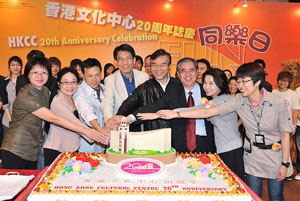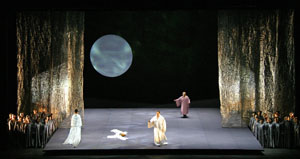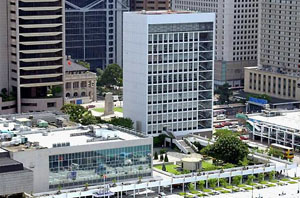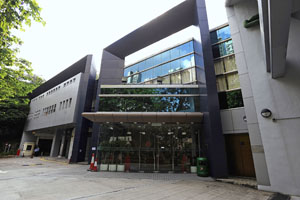
| The Deputy Director (Culture) of the LCSD, Mr Chung Ling-hoi (fourth from the left), and other guests joined in the cake-cutting ceremony at the Hong Kong Cultural Centre (HKCC) 20th Anniversary Celebration Fun Day. |
Performing Arts
In 2009-10, the Department continued to fulfil its commitment to the provision of quality cultural performances commensurate with Hong Kong's status as Asia's world city. Throughout the year, we presented a diverse and innovative range of programmes featuring local and internationally renowned artists and ranging from thematic traditional festival events for mass participation to audience building activities at the community and school levels. The Department also manages quality cultural performance facilities, such as the Hong Kong Cultural Centre which are the cultural foci of the local community and attract many visitors with a colourful array of cultural events.
Committee on Performing Arts
The Department gives its full support to the Committee on Performing Arts and its three working groups on programme promotion and audience development policies, arts education and venue hiring policies by providing professional input and relevant information for discussion at meetings. To follow up on the Committee's Recommendation Report (I), the Department has established the Committee on Venue Partnership to implement the Venue Partnership Scheme. It also continues to work with the Programme and Development Committee and the six Art Form Panels to formulate strategies for programme presentation and promotion, to identify and support the development of local budding and small-scale performing arts groups, and to review programme planning and resource allocation policies.
Hong Kong Cultural Centre
Situated on the Tsim Sha Tsui waterfront, the Hong Kong Cultural Centre has been hailed as the territory's premier arts centre since its opening in 1989.
Catering for a wide variety of performing arts activities, the Centre comprises a 2 019-seat Concert Hall, a 1 734-seat Grand Theatre and a Studio Theatre with a maximum capacity of 496. A total of 764 performances attracting more than
722 000 patrons were staged in 2009-10. To mark the Centre's 20th anniversary in 2009, a rich array of more than 40 celebration programmes was arranged. Highlights included performances by the National Theatre of China, Orchester der KlangVerwaltung and Chorgemeinschaft Neubeuern (Germany), John Williams, Gidon Kremer and Kremerata Baltica, Yo-Yo Ma and Kathryn Stott, and many local performing groups and artists, including the Centre's four venue partners, the Hong Kong Philharmonic Orchestra, the Hong Kong Chinese Orchestra, the Hong Kong Ballet and Zuni Icosahedron. Other highlights of the anniversary celebration included dance performance by Mui Cheuk-yin, Piano Pals Singing Happy Birthday by Nancy Loo, Gabriel Kwok, Eva Lue and Tam Ka-kit, Opera Hong Kong performing Mozart's Magic Flute, as well as a joint pipe organ concert by graduates of the Centre's Organ Education Series 1999-2008 and a Fun Day. The Centre is the major venue for Hong Kong's four large-scale festivals, namely, the Hong Kong Arts Festival, the Hong Kong International Film Festival, the International Arts Carnival and the Autumn Thematic Arts Festival. Concerts by Maurizio Pollini, Staatskapelle Dresden (Germany), and the Choir of King's College Cambridge (UK), performances by the U Theatre (Taiwan) and Za Ondekoza (Japan), and a production of Guo Wenjing's Opera Poet Li Bai were other highlights of 2009-10.
 |
|
||
 |
|
||
With a panoramic view of Victoria Harbour as its backdrop, the Centre's outdoor piazza is an equally popular spot for major spectacular functions, such as International Museum Day, the Opening Ceremony of the Hong Kong 2009 East Asian Games (EAG), Cantonese Opera Day and the International Chinese New Year Night Parade.
Hong Kong City Hall
Opened in March 1962, Hong Kong City Hall was the first civic centre built for the Hong Kong community. The complex's classic Bauhaus-style has made it one of Hong Kong's design landmarks since the 1960s. In December 2009, the Antiquities Advisory Board designated City Hall as a Grade 1 Historic Building.
 |
|
||
City Hall houses a 1 434-seat Concert Hall, a 463-seat Theatre and a 590-square-metre Exhibition Hall. About 390 000 patrons attended 643 performances staged in 2009-10. In addition to their local counterparts, distinguished visiting artists and arts groups showcasing their performances at the venue included the Hebei Clapper Opera Troupe of Beijing and the Clapper Opera of Shanxi (China), the National Theatre of China, En Chordais Ensemble (Greece), the Sydney Symphony Orchestra (Australia), I Solisti Veneti (Italy), Folk N' Blues Moriarty (France), Rene Jacobs and the Freiburg Baroque Orchestra (Germany), the Guy Barker Jazz Orchestra (UK), the Meta4 Quartet (Finland), Ladysmith Black Mambazo (South Africa), Gorilla Crew (South Korea), Michel Dalberto, David Garrett and Mikhail Rudy. City Hall was also one of the main venues for major arts festivals held during the year.
Community Arts Facilities
Hong Kong also boasts a range of other arts facilities throughout its territory that serve as focal points for cultural activities in individual communities. These include larger venues, such as the Sha Tin, Tsuen Wan, and Tuen Mun town halls and the Kwai Tsing, Yuen Long, and Ko Shan theatres, and smaller venues, such as the Sai Wan Ho, Sheung Wan, Ngau Chi Wan, and Tai Po civic centres and the North District Town Hall. Many of these venues have been serving the community for many years, and Kwai Tsing Theatre, one of the most recently established venues has already celebrated its 10th anniversary in 2009.
To promote and encourage the arts at the grassroots level, the district arts bodies that organise cultural activities for the local community now enjoy free use of these facilities through venue sponsorship. In 2009-10, about 110 community arts groups were offered sponsorship for approximately 740 activities that served more than 120 000 people. Various independent organisations also frequently hire the ancillary facilities for arts-related activities.
Support for Cantonese Opera
It is the Government's policy to support the development of Cantonese opera in Hong Kong. To address the concerns of the Cantonese Opera Advisory Committee, which was established by the Home Affairs Bureau in 2004, as well as the Cantonese opera sector's high level of demand for performance venues, the Department has introduced a series of booking measures for professional Cantonese opera troupes. These measures include a special advance booking service at the Ko Shan Theatre and priority booking for specific periods at urban performance venues and other performing arts venues in the New Territories.
Planning for New Facilities
Two new venue projects are currently in the planning stage. The first involves the conversion of the Yau Ma Tei Theatre and Red Brick Building into a Xiqu Activity Centre with a 300-seat theatre, and the second is the construction of an Annex Building at the Ko Shan Theatre to house a 600-seat theatre and large-scale rehearsal rooms. The two projects, which are scheduled for completion in 2011 and 2013, respectively, will provide dedicated venues for small-to-medium scale and experimental Cantonese opera performances, training and rehearsals.
 |
|
||
Venue Partnership Scheme
To provide a supportive environment for the sustainable development of the performing arts, a three-year Venue Partnership Scheme was fully implemented in April 2009. The Scheme engages 20 venue partners, including individual groups, joint groups and consortia, in organising performing arts activities of various types at 11 performing arts venues. The aim is to foster partnership between venues and performing arts groups, with the primary objectives of building up the artistic image and character of the former, enlarging the audience base, optimising facility usage, encouraging community involvement in the development of the arts, and contributing to the healthy development of the performing arts scene.
Venue |
Partners |
|
(1) |
Hong Kong City Hall |
|
(2) |
Hong Kong Cultural Centre |
|
(3) |
Kwai Tsing Theatre |
|
(4) |
Ngau Chi Wan Civic Centre |
|
(5) |
North District Town Hall |
|
(6) |
Sai Wan Ho Civic Centre |
|
(7) |
Sha Tin Town Hall |
|
(8) |
Sheung Wan Civic Centre |
|
(9) |
Tsuen Wan Town Hall |
|
(10) |
Tuen Mun Town Hall |
|
(11) |
Yuen Long Theatre |
|
Support to the venue partners is provided in various forms, including the priority use of venue facilities and the provision of funding and enhanced publicity. In 2009-10, the 20 venue partners presented 613 stage performances and 545 audience building activities, attracting a total audience of about 795 000.